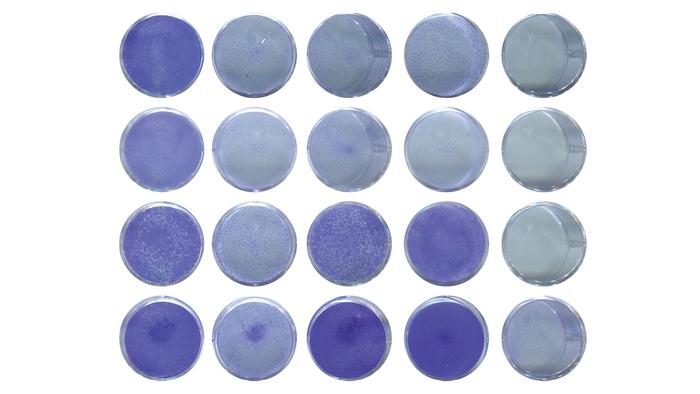Things aren’t always as they seem. Take pancreatic cancer, for example. In up to one in 10 cases, researchers have documented a peculiar characteristic. Some of the pancreatic cells appear to have lost their identity. It’s as if they forget what they are.

Credit: Vakoc lab/Cold Spring Harbor Laboratory
Things aren’t always as they seem. Take pancreatic cancer, for example. In up to one in 10 cases, researchers have documented a peculiar characteristic. Some of the pancreatic cells appear to have lost their identity. It’s as if they forget what they are.
“This is very bizarre. You see pancreatic cancer, which usually somewhat resembles the original organ, losing those features and basically becoming akin to skin or esophagus—these other very unrelated tissues, ” explains former Cold Spring Harbor Laboratory (CSHL) postdoc Diogo Maia-Silva, now at Massachusetts General Hospital.
For years, researchers have wondered exactly how this deadly disease, known as basal-like pancreatic cancer, works. Now, Maia-Silva and colleagues at CSHL have discovered that a protein called MED12 may play a critical role. While the discovery is notable in and of itself, it also builds on decades of CSHL research.
Twenty-five years ago, CSHL Professor Alea Mills discovered that a protein called p63 is important for the formation of normal basal cells—small cells in the lower part of the epidermis. Later research from CSHL Professor Christopher Vakoc found that this protein can also cause pancreatic cancer to become basal-like. Exactly how was unclear. Maia-Silva joined Vakoc’s lab in 2018, wanting to continue this investigation. Because p63 is notoriously difficult to target with drugs, he wondered which other molecules it might work with to confuse cells.
With his colleagues, he developed a method to screen the entire genome of basal-like cancer cells and rank which genes were most important for maintaining their new identity. In all his tests, MED12 rose to the top. This gene contains instructions for making the MED12 protein, one of about 25 in a complex that regulates gene activity.
“That was very unexpected because it’s part of this broad complex, but [most] other members of the complex didn’t show up. Despite being part of this general machinery of the cell, [MED12] has some unique property that makes it more important for basal biology,” says Maia-Silva.
Further tests showed that MED12 and p63 bind directly to each other. This suggests that each may be required to turn pancreatic cells basal-like. If researchers could one day figure out how to stop this interaction, it’s possible they could prevent pancreatic cancer from going basal. However, Maia-Silva is quick to note, this isn’t “something that can be easily done.” Still, “this is exciting,” he adds. “Finding these critical partners is sort of a first step toward blocking the pathway.”
It’s a new beginning but also yet another exciting conclusion in a string of discoveries at CSHL.



